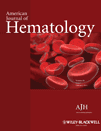
AMERICAN JOURNAL OF HEMATOLOGY
Scope & Guideline
Championing Excellence in Hematology Research
Introduction
Aims and Scopes
- Hematological Malignancies:
The journal extensively covers research on leukemia, lymphoma, and myeloma, focusing on novel therapies, clinical trials, and molecular genetics that influence treatment and prognosis. - Transfusion Medicine:
Research related to transfusion practices, blood safety, and the management of transfusion-related complications is a key area, reflecting the journal's commitment to improving patient care in transfusion settings. - Sickle Cell Disease and Thalassemia:
Papers often explore the pathophysiology, management strategies, and innovative therapies for sickle cell disease and thalassemia, aiming to improve health outcomes for affected individuals. - Coagulation Disorders:
The journal includes research on various coagulation disorders, including hemophilia and thrombosis, focusing on new treatment modalities and strategies for management. - Stem Cell Transplantation:
There is a significant emphasis on studies related to hematopoietic stem cell transplantation, including donor selection, conditioning regimens, and post-transplant outcomes. - Clinical Trials and Therapeutics:
The journal publishes findings from clinical trials of new drugs, treatment regimens, and innovative therapies, contributing to the evidence base for clinical practice.
Trending and Emerging
- Immunotherapy and CAR-T Cell Therapy:
There is a growing emphasis on the development and application of immunotherapies, particularly CAR-T cell therapies, for hematological malignancies, showcasing innovative treatment options. - Targeted Therapy and Precision Medicine:
Research focusing on targeted therapies based on genetic and molecular profiling of hematological disorders is on the rise, reflecting a shift towards personalized treatment approaches. - Biomarkers and Minimal Residual Disease Monitoring:
Emerging studies are increasingly focusing on the identification and utilization of biomarkers for disease monitoring and prognosis, particularly in acute myeloid leukemia and other malignancies. - Health Disparities and Patient-Centered Care:
The journal is increasingly addressing health disparities within hematology, emphasizing the importance of equitable care and patient-reported outcomes in treatment strategies. - Long-term Effects of COVID-19 on Hematology Patients:
Research exploring the implications of COVID-19 on patients with existing hematological conditions, including vaccine responses and management challenges, has gained prominence. - Artificial Intelligence and Machine Learning in Hematology:
There is a notable trend towards integrating artificial intelligence and machine learning into hematology research, particularly in diagnostics and treatment personalization.
Declining or Waning
- Traditional Chemotherapy Approaches:
There is a noticeable decrease in studies focusing solely on traditional chemotherapy regimens as the field moves towards targeted therapies and immunotherapies, which are now the focus of many clinical trials. - Basic Science Research:
The journal has shifted towards more clinically relevant studies, with a waning interest in purely basic science research that does not directly translate to clinical applications. - Epidemiological Studies:
Although still important, there appears to be a reduction in the volume of studies that solely focus on the epidemiology of hematological disorders, as the emphasis shifts towards treatment outcomes and therapeutic innovations. - Longitudinal Studies in Hematology:
Fewer longitudinal studies are being published, as funding and interest may be shifting towards more immediate, impactful clinical trials and translational research.
Similar Journals
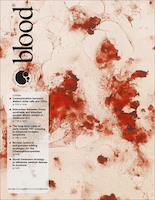
BLOOD
Pioneering Research at the Heart of Hematology.BLOOD, published by the American Society of Hematology, is a premier peer-reviewed journal in the fields of Biochemistry, Cell Biology, Hematology, and Immunology. With an impressive impact factor and ranking in the top quartiles (Q1) across multiple disciplines, BLOOD is essential reading for researchers and professionals seeking to stay updated on the latest advancements in hematology and related fields. The journal has been a cornerstone of hematological research since its inception in 1946, providing a platform for rigorous scientific inquiry and discourse. Its commitment to publishing high-quality original research, comprehensive reviews, and insightful editorials makes it a vital resource for students, practitioners, and scientists alike. By offering exceptional access to influential publications, BLOOD continues to shape the future of hematology and enhance understanding of blood-related disorders, marking its vital role in advancing both basic and clinical research.
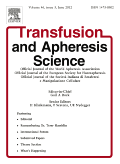
TRANSFUSION AND APHERESIS SCIENCE
Illuminating the Path of Apheresis and Transfusion ScienceTRANSFUSION AND APHERESIS SCIENCE, published by Pergamon-Elsevier Science Ltd, serves as a pivotal platform for researchers and practitioners in the fields of hematology, transfusion medicine, and apheresis. With an ISSN of 1473-0502 and an E-ISSN of 1878-1683, this peer-reviewed journal boasts a respectable Q3 ranking in the Hematology category as of 2023, positioning it within the 45th percentile among its counterparts. Operating from the United Kingdom, it provides comprehensive insights into the latest advancements and methodologies in transfusion practices and apheresis technology, crucial for enhancing patient care and therapeutic strategies. The journal's scope, covering key developments from 1996 to 2024, allows for a deep exploration of historical and emerging trends within the discipline. Moreover, its open access options facilitate widespread dissemination of research findings, fostering collaboration and innovation in the scientific community. For those dedicated to advancing knowledge in hematology, TRANSFUSION AND APHERESIS SCIENCE represents an essential resource, bridging theory and practice in this vital area of healthcare.
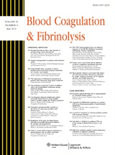
BLOOD COAGULATION & FIBRINOLYSIS
Pioneering Research in HematologyBLOOD COAGULATION & FIBRINOLYSIS, a distinguished journal in the field of hematology, is published by Lippincott Williams & Wilkins, a reputable name in academic publishing. Since its inception in 1990, this journal has been committed to advancing the understanding of blood coagulation and fibrinolysis, focusing on the molecular mechanisms, clinical implications, and therapeutic aspects of these critical processes. With an impact factor reflecting its significance within the academic community, currently ranking Q3 in both Hematology and Miscellaneous Medicine for 2023, this journal serves as a pivotal platform for researchers and professionals alike. By providing access to cutting-edge research and reviews, BLOOD COAGULATION & FIBRINOLYSIS endeavors to foster collaboration and innovation in the treatment of coagulation disorders. Interested readers can explore ongoing contributions to the field through subscriptions and institutional access options.
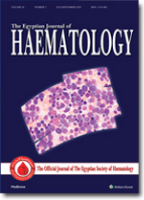
Egyptian Journal of Haematology
Empowering Hematologists with Cutting-Edge ResearchThe Egyptian Journal of Haematology, published by WOLTERS KLUWER MEDKNOW PUBLICATIONS, stands as a pivotal resource in the field of hematology, particularly within the context of Egypt and the broader Middle Eastern region. This journal is dedicated to disseminating high-quality research that explores the latest advancements in blood disorders, hematologic malignancies, and transfusion medicine. With a focus on original research, case studies, and reviews, it aims to provide a comprehensive platform for hematologists, researchers, and healthcare professionals to enhance their understanding and management of hematological conditions. Although it is not an open-access journal, the rigorous peer-review process ensures that only the most impactful studies are published, contributing to the journal's reputation in the academic community. The Egyptian Journal of Haematology serves as an essential tool for advancing knowledge, improving clinical outcomes, and fostering collaboration among experts in the field.

Experimental Hematology & Oncology
Advancing the Frontiers of Blood and Cancer ResearchExperimental Hematology & Oncology is a premier journal published by BMC, dedicated to advancing knowledge in the fields of hematology, oncology, and cancer research. Since its inception in 2012, this Open Access journal has emerged as a vital resource for researchers and healthcare professionals, fostering the dissemination of high-quality research that enhances our understanding of blood disorders and malignancies. With impressive rankings in Quarters 1 of key categories including Cancer Research, Hematology, and Oncology, it holds significant prestige, evidenced by its Scopus rankings: #42/404 in Medicine (Oncology) and #17/137 in Medicine (Hematology). The journal aims to publish cutting-edge studies, reviews, and perspectives that contribute to the evolution of therapeutic strategies and innovative treatment modalities. Researchers and practitioners alike will find this journal indispensable for staying at the forefront of breakthroughs in hematological and oncological research.
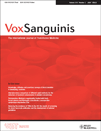
VOX SANGUINIS
Advancing Hematology Through Innovative ResearchVOX SANGUINIS is a distinguished peer-reviewed journal in the fields of Hematology and Medicine, published by Wiley, a leading academic publisher based in the United Kingdom. With a rich history dating back to its inception in 1952, this journal has consistently provided a platform for innovative research and insightful reviews, advancing the understanding of blood-related disorders and therapies. As evidenced by its robust performance—ranking #57 out of 137 in Scopus for Medicine in Hematology and holding a Q2 classification in both Hematology and miscellaneous Medicine categories—VOX SANGUINIS is recognized for its significant contributions to the scientific community. This journal serves as a vital resource for researchers, professionals, and students alike, fostering knowledge exchange and collaboration within the field. With its ongoing commitment to quality and integrity, VOX SANGUINIS continues to shape the future of hematological research well into 2024 and beyond.
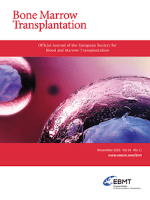
BONE MARROW TRANSPLANTATION
Connecting Researchers to Transform Transplantation Practices.BONE MARROW TRANSPLANTATION, published by SpringerNature, stands as a leading journal in the fields of Hematology and Transplantation, as evidenced by its recognition in the Q1 category for both disciplines according to 2023 rankings. With an impressive impact factor and notable Scopus rankings—7th out of 54 in Medicine Transplantation and 25th out of 137 in Medicine Hematology—this journal is instrumental for researchers and professionals dedicated to advancements in bone marrow transplantation practices and research. Established in 1986, the journal publishes original research, clinical studies, and reviews that push the boundaries of current knowledge, making it essential reading for those looking to stay abreast of the latest developments in the field. Although offering limited Open Access options, BONE MARROW TRANSPLANTATION reaches a broad audience and furthers a global dialogue on best practices and innovative approaches in transplantation medicine. Its address in London, UK positions it at the heart of international research collaboration, fostering connections among scientists, clinicians, and students alike.

Indian Journal of Hematology and Blood Transfusion
Transforming Blood Health: Where Research Meets PracticeIndian Journal of Hematology and Blood Transfusion, published by SPRINGER INDIA, serves as a leading platform for disseminating original research, reviews, and case studies in the field of hematology. With an ISSN of 0971-4502 and E-ISSN 0974-0449, this journal has been instrumental in advancing knowledge from 2000 to 2024, providing insights into critical issues surrounding blood disorders and transfusion practices. Currently ranked in the Q3 category for Hematology for 2023, it reflects a commitment to high-quality scientific content amidst a competitive landscape where it ranks 97/137 in Scopus for Medicine - Hematology, placing it in the 29th percentile of its peers. The journal primarily addresses a diverse readership, including researchers, healthcare professionals, and students, aiming to foster innovation and collaboration within the field. Although it operates under a subscription model, access options for individual articles and institutional subscriptions ensure that valuable research is disseminated widely to enhance medical practice and education in hematology.
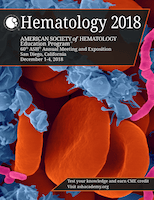
Hematology-American Society of Hematology Education Program
Transforming Hematology through Comprehensive LearningHematology-American Society of Hematology Education Program is a premier peer-reviewed journal dedicated to advancing the field of hematology through comprehensive educational content. Published by the American Society of Hematology, this journal plays a crucial role in disseminating knowledge to researchers, clinicians, and students in hematology and related disciplines. With an impressive Q1 status in the field, it ranks among the top journals at the forefront of hematological research, as evidenced by its 60th percentile ranking in Scopus' Medicine - Hematology category. Although it does not offer open access, the journal provides invaluable insights and educational resources from leading experts, focusing on the latest advancements, treatment protocols, and evolving understanding of blood disorders. Covering a wide range of topics, from basic research to clinical applications, this journal is essential for anyone seeking to deepen their expertise and stay informed on the latest developments in hematology. For further engagement, readers can access insightful articles published since 2001, ensuring a rich repository of knowledge for ongoing research and clinical excellence.

INTERNATIONAL JOURNAL OF HEMATOLOGY
Pioneering Discoveries in Hematological ScienceThe INTERNATIONAL JOURNAL OF HEMATOLOGY, published by SPRINGER JAPAN KK, serves as a critical platform for advancing research in the field of hematology. With a prestigious history spanning over three decades from 1991 to 2024, this journal is recognized for its impactful contributions, evidenced by its Q2 category ranking in Hematology for 2023, and its notable position at rank #71 out of 137 in the Scopus Medicine Hematology category. Researchers and professionals within the hematology community benefit from the journal's rigorous peer-reviewed articles that cover a wide range of topics, including clinical studies, basic research, and novel therapeutic strategies. Though currently non-open access, it provides essential insights and findings to an audience passionate about the latest advancements in blood disorders and treatments. Situated in Japan, the journal not only showcases high-quality research but also fosters a global exchange of knowledge in hematology, making it a significant resource for scholars, practitioners, and students alike.